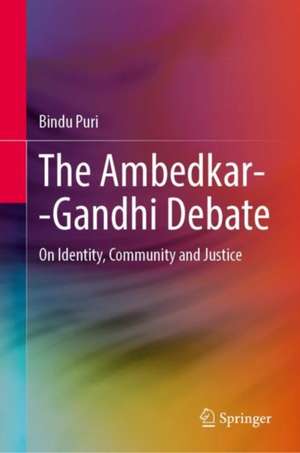The Ambedkar–Gandhi Debate: On Identity, Community and Justice
Autor Bindu Purien Limba Engleză Hardback – 23 feb 2022
- The nature of the self,
- The relationship between the individual self and the community,
- The appropriate relationship between the constitutive encumbrances of the self and a conception of justice,
- The relationship between memory, tradition, and self-identity.
Ambedkar and Gandhi’scontrary conceptions of the self, history,itihaas, community and justice unpack incommensurable world views. These can be properly articulated only as very different answers to questions about the relationship between the present and the past. This book raises these questions and also establishes the link between the Ambedkar--Gandhi debate in the early 20th century and its re-interpretation as it resonates in the imagination and writing of marginalized social groups in the present times.
| Toate formatele și edițiile | Preț | Express |
|---|---|---|
| Paperback (1) | 696.18 lei 6-8 săpt. | |
| Springer Nature Singapore – 24 feb 2023 | 696.18 lei 6-8 săpt. | |
| Hardback (1) | 702.54 lei 6-8 săpt. | |
| Springer Nature Singapore – 23 feb 2022 | 702.54 lei 6-8 săpt. |
Preț: 702.54 lei
Preț vechi: 826.53 lei
-15% Nou
Puncte Express: 1054
Preț estimativ în valută:
134.49€ • 138.39$ • 113.37£
134.49€ • 138.39$ • 113.37£
Carte tipărită la comandă
Livrare economică 28 februarie-14 martie
Preluare comenzi: 021 569.72.76
Specificații
ISBN-13: 9789811686856
ISBN-10: 9811686858
Pagini: 266
Ilustrații: XV, 266 p. 2 illus.
Dimensiuni: 155 x 235 mm
Greutate: 0.58 kg
Ediția:1st ed. 2022
Editura: Springer Nature Singapore
Colecția Springer
Locul publicării:Singapore, Singapore
ISBN-10: 9811686858
Pagini: 266
Ilustrații: XV, 266 p. 2 illus.
Dimensiuni: 155 x 235 mm
Greutate: 0.58 kg
Ediția:1st ed. 2022
Editura: Springer Nature Singapore
Colecția Springer
Locul publicării:Singapore, Singapore
Cuprins
1. Chapter 1. Introduction: A Brief History of the Gandhi--Ambedkar Debate.- Chapter 2. Memory, Humiliation, Oppression: Untouchability and Dalit Self-Identity.- Chapter 3. The Individual and the Religious Community: On Religion and Conversion.- Chapter 4. Individual and Collective Identity: Confrontations on Caste and Varna.- Chapter 5. The Politics of an Encumbered Self: Ambedkar and Gandhi on Separate Electorates.- Chapter 6. Debating Guru: Owners and Authors.- Chapter 7. Conclusion: Gandhi and Ambedkar: Philosophical divergences and convergences.
Recenzii
“The book is a must-read for encapsulating the deeper philosophical issues informing the debate between Ambedkar and Gandhi. The author’s long-term familiarity with Gandhi-Ambedkar scholarship … has gained fresh new ground evident in the deep, insightful, and critical reflection on the contradictions involving the two great leaders on the universal ideas of freedom, autonomy and justice. The book will be of value to those who wish to unravel Gandhi-Ambedkar scholarship beyond the conventional polemics and hagiography surrounding the two scholars.” (Sanjeev Kumar and Ratika Gaur, Gandhi Marg Quarterly, Vol. 44 (4), 2023)
Notă biografică
Bindu Puri is a Professor of contemporary Indian Philosophy at the Centre for Philosophy, School of Social Sciences, Jawaharlal Nehru University. Her main interests in philosophy are in the areas of contemporary Indian philosophy and moral and political philosophy. She has been seriously engaged with the philosophy of M.K Gandhi and her first monograph was on Gandhi and the Moral Life (2004).She has also been keenly interested in the philosophical issues involved in Gandhi’s debates with Savarkar, Ambedkar and Tagore.Her monograph The Tagore-Gandhi Debate: On Matters of Truth and Untruth ( Springer,2015)was published in the series: Sophia Studies in Cross-cultural Philosophy of Traditions and Cultures. She has edited seven volumes and has written over 50 papers in edited anthologies and philosophical and interdisciplinary journals including Sophia, Philosophia and the Journal of the Indian Council of Philosophical Research. She has presented over 160 papers and lectures at nationaland International forums. Professor Puri delivered the prestigious annual ‘M K Gandhi lecture on Peace and the Humanities’ 2017 for the Mahatma Gandhi Peace Council Of Ottawa, Canada and the Johnson and Hastings lectures at the University of Mount Allison Canada for the same year.
Textul de pe ultima copertă
This book reconstructs the philosophical issues informing the debate between the makers of modern India: Ambedkar and Gandhi. At one level, this debate was about a set of different but interconnected issues: caste and social hierarchies, untouchability, Hinduism, conversion, temple entry, and political separatism. The introduction to this book provides a brief overview of the engagements and conflicts in Gandhi and Ambedkar's central arguments. However, at another level, this book argues that the debate can be philosophically re-interpreted as raising their differences on the following issues:
Ambedkar and Gandhi’scontrary conceptions of the self, history,itihaas, community and justice unpack incommensurable world views. These can be properly articulated only as very different answers to questions about the relationship between the present and the past. This book raises these questions and also establishes the link between the Ambedkar--Gandhi debate in the early 20th century and its re-interpretation as it resonates in the imagination and writing of marginalized social groups in the present times.
- The nature of the self,
- The relationship between the individual self and the community,
- The appropriate relationship between the constitutive encumbrances of the self and a conception of justice,
- The relationship between memory, tradition, and self-identity.
Ambedkar and Gandhi’scontrary conceptions of the self, history,itihaas, community and justice unpack incommensurable world views. These can be properly articulated only as very different answers to questions about the relationship between the present and the past. This book raises these questions and also establishes the link between the Ambedkar--Gandhi debate in the early 20th century and its re-interpretation as it resonates in the imagination and writing of marginalized social groups in the present times.
Caracteristici
Provides re-interpretation of Ambedkar--Gandhi debate on caste, untouchability, Hinduism, and political separatism Argues that the debate involved conflicts about the inter-relationships between identity, community, memory, and justice Links the debate in the early 20th century with its re-interpretations in more contemporary times
